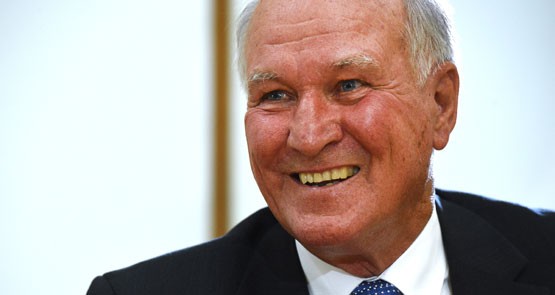
Former independent MP for New England Tony Windsor has announced he will challenge Deputy Prime Minister Barnaby Joyce for his old seat at the upcoming election.
Windsor threw his hat in the ring this morning at a press conference in Parliament House, rather than his electorate, announcing that his decision to return to politics was due to progress in New England “stalling” under Joyce, and quoted Australian of the Year David Morrison in saying it was not a standard he could walk past and accept.
Windsor retired at the 2013 election after three years as part of a hung Parliament and a minority government led by then-prime minister Julia Gillard. Windsor, as one of the independents who backed Gillard over Tony Abbott, faced a sustained campaign against him for the sin.
“‘I think you’re all aware of some of the circumstances of the hung Parliament, the vitriol that has been out there, the campaigns . . . that have been levelled at the independents in particular but the Parliament as well. That has had an impact on our family,” he said at the time.
Windsor now stands proudly by his achievements during the Gillard government, including ensuring Gonski education funding, action on climate change, and the National Broadband Network. In siding with Gillard’s NBN plans in 2010, Windsor uttered his now famous line: “Do it once, do it right, do it with fibre.” Armidale became the first town in Australia to receive the full fibre-to-the-premises service, and Windsor said he would now fight for the full NBN to be restored:
“I’m not prepared to see regional people, people in the electorate of New England, treated as second-class citizens with their education of their kids, the Gonski, with their telecommunications, that the cities will eventually get in terms of fibre to the premise because of scale, in relation to climate change, the mitigation, the drought, all of those things.”
Windsor has previously said that before the 2013 election, the Coalition had promised millions in funding for the Armidale Hospital, but this funding was withdrawn after Windsor decided not to contest. Today he said that he now expected the government to pull out all stops and suddenly go on spending sprees.
“It will come out — I’ve said to the councils and if there’s any of them watching, get your projects out, get your projects out because the debt and deficit thing has suddenly disappeared. It won’t be an issue.”
Although Windsor himself not wanting to be tarred with labels like conservative or progressive (he pointed out in his press conference that he backed the NSW Nick Greiner government), Windsor became something of a progressive hero during the Gillard government, and afterwards as he campaigned against the Shenhua mine in the Liverpool Plains. Windsor explained he was not opposed to coal mines, but said coal-seam gas mining would have a devastating impact on water resources.
As Crikey‘s Guy Rundle reported, Windsor has spent the past few years actively campaigning against the Shenhua mine. Joyce is also opposed to the mine, but Windsor has said that Joyce has done nothing, even with responsibility for water in government, to attempt to stop the mine.
On the issue of same-sex marriage, Windsor said he voted against it when it came up during the Gillard government because that was what he believed his electorate’s view to be. He said he believed that had now changed, but said he supported the plebiscite — although he has reservations about the possibility for hate speech during the campaign.
At the last election, where Windsor did not contest, Joyce received 54% of the first-preference vote. ABC election analyst Antony Green said today that although it would be competitive, it was unlikely with Joyce now in the seat, and the deputy prime ministership, that Windsor would enjoy the 60% of the vote he took when he last contested the seat in 2010.
Windsor said he had considered a Senate run, but he did not go into the reasons why he decided against it. Green said that the changing voting rules for the Senate would make it harder for Windsor to get enough statewide votes to get elected to the Senate.








It’s hard to imagine a higher (or better) profile for an independent candidate.
Tony Windsor has always had a deft touch when it comes to politics.
Barnbaby must be sweating like Joe Hockey on a bad day right now.
This raises the question “How florid can the chameleon in Jethro go?”
It is a fine decision by Tony Windsor to give the voters of New England the opportunity to tell him what they think of him, something he denied them in 2013.
is he standing for labor preselection ??
Windsor is one of the few politicians who would never sell constituents down the river. Hopefully, New England will remember the benefits Windsor extracted from the Gillard government during his tenure.
Voters are inclined to forget easily, they need to be reminded.
Cousin Jethro will be pushed to an even brighter shade of beetroot during this campaign.